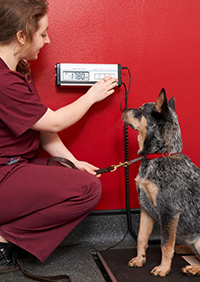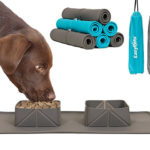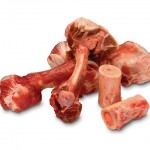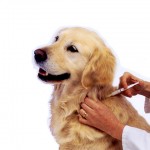By Robert Mueller
 Your dog‘s weight could cause health problems. Your dog‘s weight could cause health problems. |
Veterinarian Dr. Denise Elliott DVM, PhD of Banfield Pet Hospital in Portland, Oregon recently published a report noting that diabetes is on the rise in our pets. This disease can include symptoms of excessive urination, increased thirst, lethargy and sudden blindness.
Did you know that diabetes is closely tied to obesity and often requires lifelong veterinary treatment? Obesity in dogs has many other negative implications:
- Obesity can lead to further complications like cardiovascular disease, skeletal problems such as hip dysplasia, spinal compression, eventual pain, lameness, and a lack of agility.
- Musculoskeletal problems greatly influence a dog’s ability to exercise thus contributing to further weight gain and weight-related problems. Just as with humans, lack of physical exercise affects the emotional, endocrinal, and neurological states of your dog.
- It is estimated that 95% of digestive issues leading to vomiting and diarrhea are actually caused by overeating and making poor diet choices for your pet. Balancing fats, proteins and reduced carbohydrates along with the necessary enzymes for digestion is essential for weight control and overall health. Avoid grains and unnatural food products not intended for animals, which can exacerbate diabetes, bone and skeletal problems, digestive issues and of course gum disease.
What Can I Do To Protect My Dog Against Canine Obesity?
 Pet obesity is on the rise. |
We tend to feed our pets like we feed ourselves. The result is that an overwhelming number of both humans and pets in this country have become obese.
In the US, it is estimated that 20 to 40% of all dogs are considered obese. This, along with the Centers for Disease Control and Prevention’s statistics of 33.9 percent of adults over the age of 20 being obese, creates an alarming picture of this nation’s health. The biggest difference between the two scenarios is that a human can make a choice on what they should eat, whereby the dog is forced to consume what is given to them.
A dog whose weight is controlled does not exhibit the symptoms of an overweight dog and as a result will feel good, be mentally sharp, have more energy, and be better able to give affection.
5 Tips To Prevent Obesity in Your Pet
 Sweets are not a healthy treat. |
- Prevention is key – some suggestions include strictly feeding a raw meat-based diet and avoiding foods with additives, preservatives and food coloring. It’s important to maintain a proper balance of proteins, fats and carbohydrates that are specifically blended for a healthy canine diet. This ensures that your dog is not deprived of the natural source of enzymes that are beneficial for healthy digestion.
- Feed your pet regularly and at specific times each day. This helps prevent overfeeding and keeps your pet satiated throughout the day.
- Treats should also be kept to a minimum because this additional calorie load can add to the problem. The following are suggestions of treat and other food items that should be completely eliminated from your pet’s diet:
- Ice cream
- Processed cheese
- Candy, cookies and other sweets
- Cooked bones as they can tear intestinal walls (raw bones are okay)
- Salty crackers, meats, and hot dogs
- Avocados
- Tomatoes
- Cashews, pistachios and other nuts that are high in fat
- Chocolate*
- Tylenol or medications containing ibuprofen*
*NOTE: These items can be very harmful and even fatal for your dog. Consult your veterinarian immediately if your pet has ingested these foods.
- Make sure to make time in your busy schedule to exercise your dog regularly. Remember, some high-performance dog breeds like border collies and German Shepherds require more exercise than others so a short walk around the block might not be enough for these breeds.
- Feed your dog a biologically appropriate raw food (BARF) diet that is high in protein and low in carbohydrates. A BARF diet helps your pet maintain proper digestion to keep him nutritionally satisfied throughout the day and gives him the right amount of enzymes, vitamins, minerals and natural dietary ingredients he needs to stay healthy and strong.
As your pet’s guardian it is important to give them the best chance of living a long and healthy life. Though some find feeding a high-quality BARF diet a big investment in the beginning, you will find that the cost of medical treatment, x-rays, labs, teeth cleaning, expensive medical complications that lead to surgical interventions, etc. should be dramatically reduced and/or eliminated. This notable reduction makes pet ownership the joy it was meant to be.
So you see, it’s not that hard to keep your pet’s weight in order if you stick to the tips outlined above. If you do, you will have a healthy, happy animal that will perhaps enjoy a longer life and maintain a healthy weight for the long haul.
Source:
Robert Mueller, BSc, Pharm. is a registered pharmacist, author of “Living Enzymes: The World’s Best Kept Pet Food Secret”.










